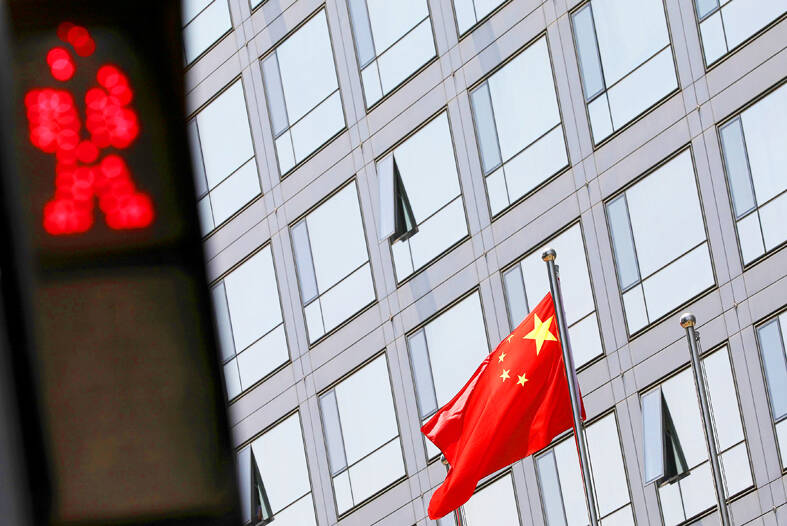Taiwanese firms had, in terms of book value, invested approximately NT$8.5 trillion (US$262.73 billion) in China and Hong Kong as of June 30, while 68 out of 700 Taiwanese companies that had explored business opportunities in China had 100 percent risk exposure, government reports showed.
China last month announced that it was auditing the taxes of Hon Hai Precision Industry Co (鴻海精密), known internationally as Foxconn Technology Group (富士康科技集團), sparking concern over the risks faced by Taiwanese firms with investments in China and Hong Kong.
Risk exposure is calculated based on the amount invested elsewhere compared with the net worth of the parent company, which represents the rights of the shareholders.

Photo: Reuters
Listed Taiwanese companies are expected to submit a quarterly report showing all funds wired from Taiwan, all funds wired and the dividends made, as well as the net quarterly profit or loss and total book value at the end of the quarter.
If the amount of investment in China exceeds the net worth of the parent company, it is considered overt risk exposure.
Of the 68 Taiwanese companies that exceeded 100 percent risk, 26 were listed as registered in the Cayman Islands or were foreign companies that were not listed abroad but were listed in Taiwan.
Disregarding companies registered in the Cayman Islands and companies whose parent companies had a net worth under NT$10 billion, there were 16 firms whose risk exposure in China exceeded 100 percent, with paper manufacturing company Longchen Paper & Packaging Co (榮成) topping the list with an overexposure rate of 165.98 percent.
Longchen Paper is China’s fourth largest paper manufacturer, with more than 20 subsidiaries. As of June 30, it had invested NT$11.8 billion in China, or more than 50 percent of the net worth of its parent company.
In second place was computer firm Clevo Co (藍天電腦), with an overexposure rate of 156.11 percent and investments of NT$63 billion.
Hon Hai had a net worth of NT$1.39 trillion, an overexposure rate of 117.12 percent and an end-of-quarter book value of NT$1.6 trillion. It had invested NT$203.8 billion in China.
Taiwan Semiconductor Manufacturing Co (台積電) with a total net worth of NT$3.18 trillion, had only invested NT$49.4 billion, and its exposure rate was 5.6 percent.
Ninety percent of Taiwanese firms invested via third-party intermediaries, with only 10 percent making a direct investment. Hon Hai, for example, made all of its investments via third-party intermediaries.
Statistics showed that funds wired to China from Taiwan exceeded NT$2.2 trillion, but if the investment capital was multiplied by the stakes held by Taiwanese businesspeople, the total value of Taiwanese funds wired to China exceeded NT$3.3 trillion.
From 1991 through the end of September, Taiwan approved 45,444 applications to invest in China, with total funds valued at NT$6.4 trillion, data from the Ministry of Economic Affairs showed.
However, the Chinese Ministry of Commerce said that up until the end of last year, it had only approved 120,000 investment applications from Taiwan, with total funds valued at NT$2.3 trillion.
Additional reporting by Fang Wei-chieh

A Chinese aircraft carrier group entered Japan’s economic waters over the weekend, before exiting to conduct drills involving fighter jets, the Japanese Ministry of Defense said yesterday. The Liaoning aircraft carrier, two missile destroyers and one fast combat supply ship sailed about 300km southwest of Japan’s easternmost island of Minamitori on Saturday, a ministry statement said. It was the first time a Chinese aircraft carrier had entered that part of Japan’s exclusive economic zone (EEZ), a ministry spokesman said. “We think the Chinese military is trying to improve its operational capability and ability to conduct operations in distant areas,” the spokesman said. China’s growing

Taiwan yesterday denied Chinese allegations that its military was behind a cyberattack on a technology company in Guangzhou, after city authorities issued warrants for 20 suspects. The Guangzhou Municipal Public Security Bureau earlier yesterday issued warrants for 20 people it identified as members of the Information, Communications and Electronic Force Command (ICEFCOM). The bureau alleged they were behind a May 20 cyberattack targeting the backend system of a self-service facility at the company. “ICEFCOM, under Taiwan’s ruling Democratic Progressive Party, directed the illegal attack,” the warrant says. The bureau placed a bounty of 10,000 yuan (US$1,392) on each of the 20 people named in

Nine retired generals from Taiwan, Japan and the US have been invited to participate in a tabletop exercise hosted by the Taipei School of Economics and Political Science Foundation tomorrow and Wednesday that simulates a potential Chinese invasion of Taiwan in 2030, the foundation said yesterday. The five retired Taiwanese generals would include retired admiral Lee Hsi-min (李喜明), joined by retired US Navy admiral Michael Mullen and former chief of staff of the Japan Self-Defense Forces general Shigeru Iwasaki, it said. The simulation aims to offer strategic insights into regional security and peace in the Taiwan Strait, it added. Foundation chair Huang Huang-hsiung

PUBLIC WARNING: The two students had been tricked into going to Hong Kong for a ‘high-paying’ job, which sent them to a scam center in Cambodia Police warned the public not to trust job advertisements touting high pay abroad following the return of two college students over the weekend who had been trafficked and forced to work at a cyberscam center in Cambodia. The two victims, surnamed Lee (李), 18, and Lin (林), 19, were interviewed by police after landing in Taiwan on Saturday. Taichung’s Chingshui Police Precinct said in a statement yesterday that the two students are good friends, and Lin had suspended her studies after seeing the ad promising good pay to work in Hong Kong. Lee’s grandfather on Thursday reported to police that Lee had sent